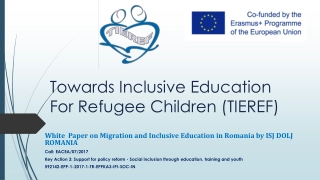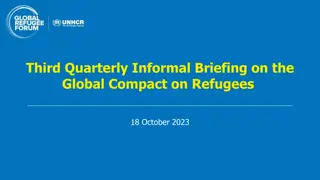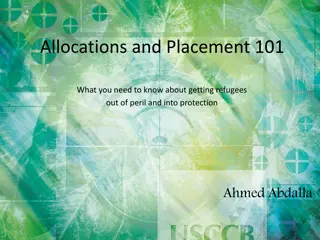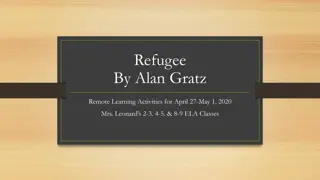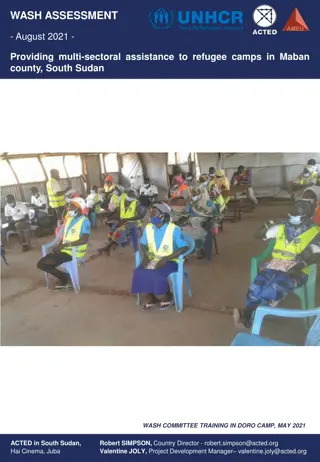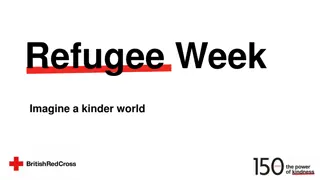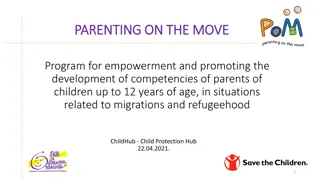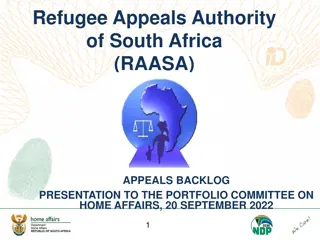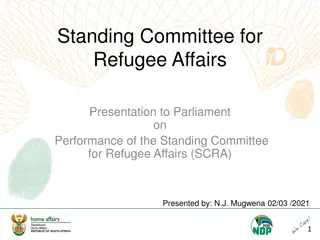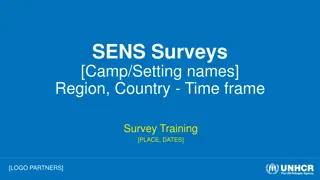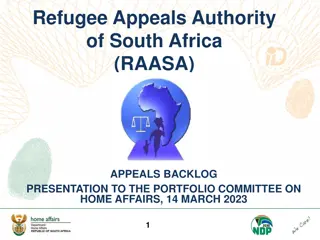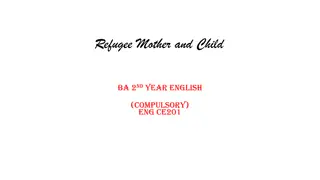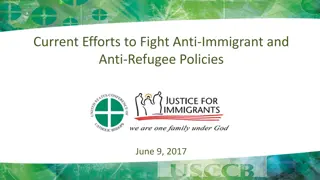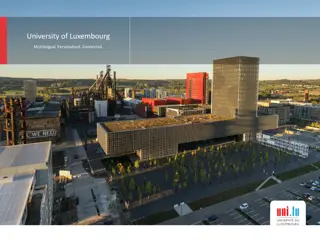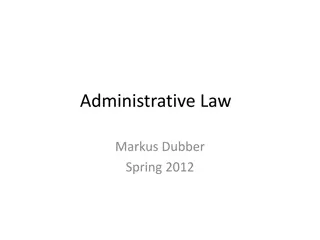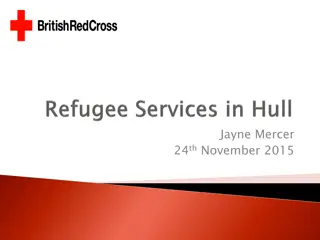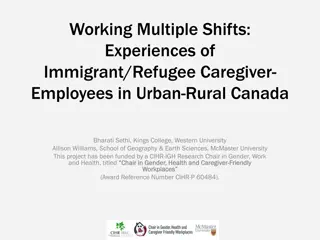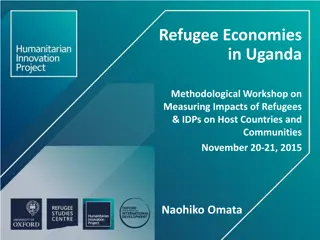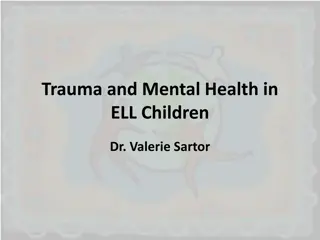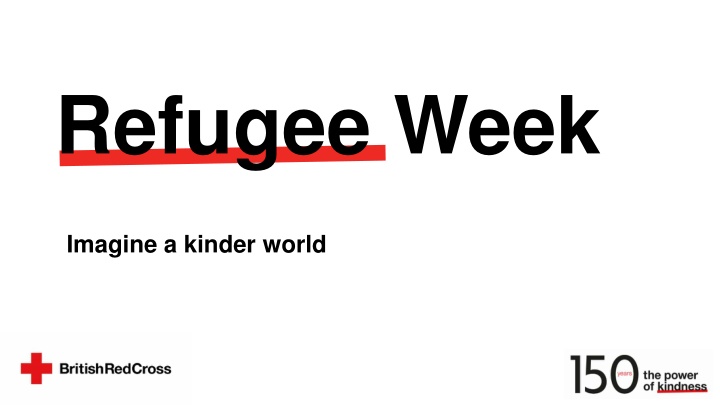
Embracing Empathy: Building Understanding and Kindness
Explore the importance of empathy and understanding through activities like role-playing and creative expressions. Reflect on the power of connection, share stories, and learn about refugees in a quest to create a kinder world.
Uploaded on | 1 Views
Download Presentation

Please find below an Image/Link to download the presentation.
The content on the website is provided AS IS for your information and personal use only. It may not be sold, licensed, or shared on other websites without obtaining consent from the author. If you encounter any issues during the download, it is possible that the publisher has removed the file from their server.
You are allowed to download the files provided on this website for personal or commercial use, subject to the condition that they are used lawfully. All files are the property of their respective owners.
The content on the website is provided AS IS for your information and personal use only. It may not be sold, licensed, or shared on other websites without obtaining consent from the author.
E N D
Presentation Transcript
Refugee Week Imagine a kinder world
Learning objectives - Build empathy - Reflect on the importance of understanding - Reflect on empathy and understanding as a kind act - Look at other stories and perspectives - Explore the lives of refugees
Empathy and understanding
Definition activity: what is empathy? What does the word empathy mean to you?
Role play: imagine it was you - Your friend doesn t understand the homework, they think it is too difficult for them. The teacher has explained but, they still don t understand. The teacher won t explain it again in a different way. - Your family member wants to share a story with the family about something significant to them. Nobody is listening to them. - Someone in your class is being told off for something they didn t do. The adult won t listen to their side of the story. They are blaming them because they just think they are a troublemaker . - Someone is calling your friend names. Other people are laughing.
Reflection activity: we could be friends If we try and understand each other, we may even become friends Maya Angelou
Creative activity: the empathy tree - Imagine that empathy is a seed. That seed can grow into a tree. It has roots and also branches. - Draw this seed on a piece of paper. Underneath draw the roots. Write five kind things we can do to build empathy and understanding with others inside or underneath each root. Use the notes from the other activities you have done. - Now draw the tree. Draw branches and leaves. On each leaf write a positive thing that can come from understanding people. Think about how it can be positive for you, for the other person, the community and the wider world. - Think about empathy, kindness and understanding. What did you learn?
Starter activity: who is a refugee? Asylum seeker Someone who leaves their homeland and arrives in another country. They make themselves known to the government and submit an asylum application so they can be seen as a refugee in another country. They have a legal right to stay in the country while their application is processed. Refugee Someone who has proven to the government that they would be at risk if returned to their home country. They have had their application for asylum accepted by the government. They can now stay there either long-term or indefinitely. Migrant Someone who has left or fled their home to go to new places to seek opportunities or safer and better prospects. This term can mean anyone who has left their country for any reason. Persecution Mistreating someone because of who they are. It may be because of their race, religion, nationality because they belong to a particular social group or their political opinion.
Reflective activity: listening to stories Read the statements below and see how far you agree or disagree with each one: - - - - - - - - - - It is easier to understand people if I know their history It is easier to understand people if I know the things they like and dislike It is easier to understand people if we have things in common I can t understand people if we have lived really different lives Reading stories makes me think about my own life and feelings I find it easy to understand the characters in books and films I think I could be friends with my favourite characters Sharing stories with other people is easy Listening to other people s stories is a challenge Once I understand a person, it is easy to be friends with them
Family and community
Reflection: what makes you feel safe? What makes you feel safe: - in your home - - - in your neighbourhood and community in your country
Game: human bingo - TOM: You didn t know much about refugees until you did a family history project at school. You learned that your grandparents were Jewish refugees from Nazi Germany in 1939. - HAMID: You are from Afghanistan. You had to leave because it was too dangerous for you. Your dad paid for someone to take you to the UK alone. You re live in a big house with lots of other boys. You ve started going to school but everything is different here the food is strange and the weather is cold and you miss your family. - ALLANAH: Your mum couldn t get a job at home in Wales, and as she knew someone who ran a hotel in Spain, you have moved there so that she can work. You are going to a Spanish school and it is hard to understand things, but every week is getting better and a girl has just started being friendly to you. You miss your friends and family, but talk to them online. - SYLVIE: You are Polish and your family have been living in Scotland for about a year. You are starting to learn the language but a lot of people are really horrible to you as soon as you start talking. You don t want to go back to Poland as your parents couldn t get a job and so you didn t have any money, but you don t like it here as you don t have any friends. - ABDULLAH: You live with your parents and sisters in Homs, in Syria. Lots of the schools, shops and hospitals have burned down and your brothers have gone away to fight. Hearing gunshots is really scary. You need to leave home and try to find somewhere safe away from the fighting.
Game: human bingo - ALMA: You moved to the UK six months ago from Somalia. You couldn t stay there as it was too dangerous. You left with your mother. You haven t been to school for a few years as you have been helping your mum with the other children in the family. You ve started at school but it s hard because you don t know much English and the house you ve been placed in is small and damp. Because your family are asylum seekers you don t have much money, but you get food vouchers from the Red Cross. - IDRIS: You came from Eritrea 4 years ago. There was no water or food, and lots of people were dying so you had to move. You have passed an exam and now have a British passport. At school people used to make fun of you but you have big dreams for the future. - LUCY: You are from the UK. You live with your parents, and your brother. You love gymnastics and dancing and want to study Computer Science when you re older. - SOLANGE: You came from the Democratic Republic of the Congo three years ago because it wasn t safe there. You ve been told that can t stay in the UK and you might have to leave. You won t get any help to buy food, it ll be harder to get treatment if you re sick and you could be forced to go back to the Congo. That makes you worry a lot, it was really scary there, and you still have nightmares about the journey. -
I can speakmy own language at school I can eat and drink when I need to I can experience myculture and heritage easily I can see my family I can be successful here whenI grow up I can feel like I m part of mycommunity I can meet my friends I can eat my favourite food I can join any group ororganisation I like When I am sick I can go to the doctor I can go to school I feel safe
Creative activity: write a letter - Write a letter to a refugee your age who is in the UK without their family. - Imagine how they must feel? What supportive words and helpful advice would you give? Think about how you deal with things when you are sad or lonely. - Think about what kind of letter you would like to receive if you were them.
Why do people leave? Push or Pull Photo activity should I stay or go
Creative activity: welcome poster Where can you get cheap clothes? Which healthservices and advicecentres are worthknowing about? How do you travelaround the area? How might someoneimprove theirEnglish? Do you have any regionalwords they shouldlearn? How do you knowwhere to go? Have you included sport or physical activities? What do you enjoydoing? Where do you go to eat? What do you eat?

